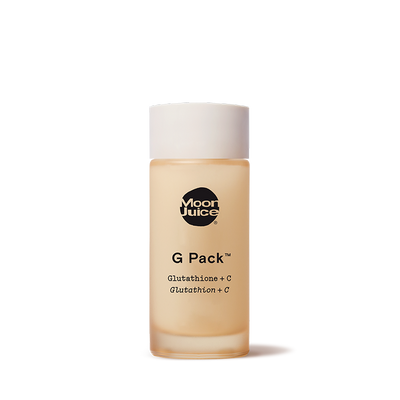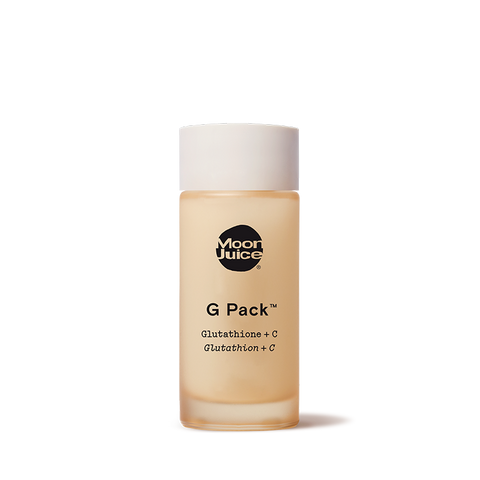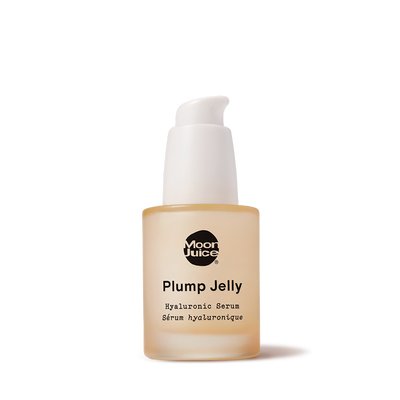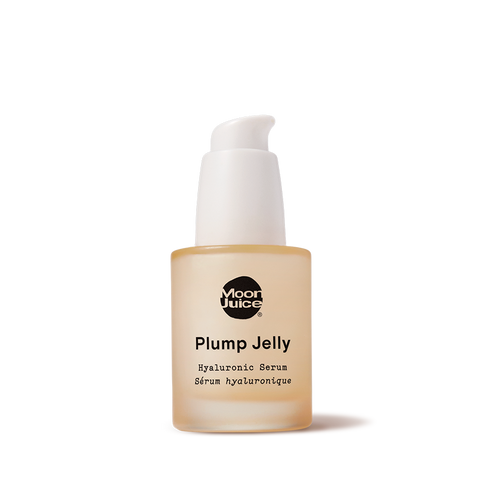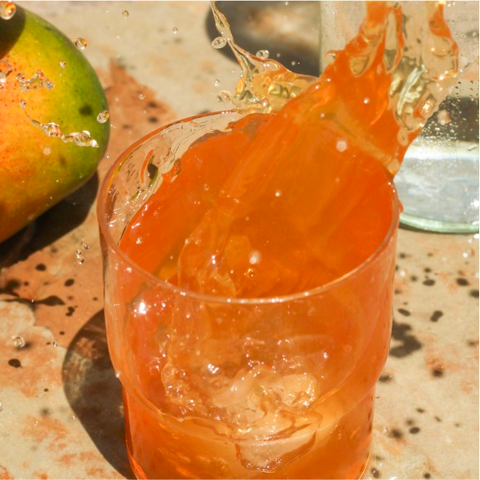Vitamin C isn’t the only antioxidant that can work wonders for your complexion and overall health. If you hope to keep hyperpigmentation, spots, and lines at bay — as well as stave off oxidative stress, aka the root cause of accelerated aging — it’s time to get Glutathione on your radar and into your routine.
Never heard of it? Read on to learn about the basics of this potent antioxidant. Plus: the most impressive benefits of Glutathione for your skin, how it’s similar to (yet also different from) Vitamin C, and how to include it in your daily regimen.
What Is Glutathione?
Also known as the master antioxidant, Glutathione is the most important low molecular-weight antioxidant synthesized in cells.
Present in every cell of the body, it helps to maintain cellular function and structure. It’s crucial to protect mitochondria from oxidative damage spurred by reactive oxygen species (ROS). Declines in mitochondrial function — i.e., decreases in mitochondrial DNA volume and integrity — are linked to accelerated aging. Research shows that high levels of Glutathione protect against cellular damage and premature aging.
Since Glutathione levels decrease over time — as well as in response to stress and from the accumulation of toxins — it’s important to replenish your levels to benefit from its free radical-fighting powers.
How Does Glutathione Benefit Your Skin?
A 2017 randomized, double-blind, placebo-controlled study investigated the effects of Glutathione supplementation of 250 to 500 milligrams in healthy female participants over 12 weeks. In addition to experiencing no major adverse side effects, the women who took either dosage experienced the following benefits of Glutathione for their skin:
- A lower melanin index
- Fewer dark spots
- A significant reduction in wrinkles
- Increased skin elasticity
Curious about how it works to yield these benefits? Glutathione inhibits the production of tyrosinase, the enzyme that creates melanin. The overproduction of tyrosinase contributes to hyperpigmentation — one of the biggest skin concerns that people with more melanated skin often have (though hyperpigmentation can affect skin tones across the spectrum). The master antioxidant also helps to regulate melanogenesis (the complex process of producing melanin) and triggers the switch from eumelanin to pheomelanin production to promote a more even skin tone. These mechanisms enable Glutathione to brighten the complexion of your natural skin tone and reduce discoloration, including post-inflammatory hyperpigmentation and dark spots from age and UV exposure.
Glutathione supplementation also restores the rate of collagen degradation. As a result, it helps to halt accelerating aging in the form of wrinkles and reduced skin elasticity. Similar to Glutathione, natural collagen levels decrease over time. Yet by integrating Glutathione into your routine, you can think of it as a 2-in-1 power ingredient that can support biological aging — and a bouncy, fresh complexion — no matter your chronological age.
Moreover, a 2014 randomized, double-blind, placebo-controlled study gauged the effects of applying topical oxidized Glutathione in healthy adult women. Twice-daily application over 10 weeks resulted in the following:
- A lower melanin index and suppression of wrinkle formation, similar to results from the ingestible Glutathione study above
- Significant increases in moisture content of the stratum corneum and enhancement in skin smoothness, demonstrating that topical Glutathione can also promote a more youthful, replenished complexion
Glutathione vs. Vitamin C
So far, Glutathione and Vitamin C have a lot in common. They’re both potent antioxidants that are beneficial in topical and dietary forms. The two also promote major skin wins — including brightening, tightening, and evening the complexion.
That said, they have three primary differences of note:
-
Glutathione is a tripeptide. It consists of amino acids (cysteine, glycine, and glutamate) — aka the building blocks of protein and collagen.
Meanwhile, Vitamin C is a micronutrient that stimulates collagen synthesis. - Glutathione is endogenous. In other words, your body makes it on its own. On the other hand, Vitamin C is exogenous, meaning your body doesn’t produce it, and you’ll need to get it through foods and/or supplements.
- They work on different parts of skin cells. As we saw above, Glutathione protects mitochondria, whereas Vitamin C serum’s benefits work on the plasma layer.
Despite these differences, both are highly beneficial for your skin health and overall health. Better yet, they work synergistically to promote a radiant complexion and support healthy aging.
How to Incorporate Glutathione into Your Skin Care Routine
1. Apply It Topically
You can think of topical Glutathione as a physical shield against environmental toxins. When toxins penetrate the skin, they increase free radicals that lead to damage and accelerate signs of aging.
G Pack™, our vitamin c powder for the face, offers a potent blend of antioxidants in powder form. Featuring 10% Glutathione, 50% Vitamin C, and 3% Ferulic Acid, it provides a protective layer that helps to replenish, defend, and repair your skin cells from the daily onslaught of aggressors like UV exposure and pollution.
This effective blend of antioxidants is safe and gentle enough to use twice daily. To max out its key benefits — brightening and evening skin tone, promoting collagen and elasticity, and minimizing the appearance of fine lines — keep the following tips in mind:
- Use 1 to 3 level scoops of G Pack™ per application. New to topical antioxidants? Start with 1 scoop to gauge tolerance, then slowly build your way up as needed.
- Mix it with Plump Jelly, our hyaluronic acid serum, or another water-based serum or moisturizer. (Glutathione and Vitamin C are both water-soluble; you can apply oil-based products later in your routine, if desired.)
- Apply to freshly cleansed, damp skin to enhance penetration and skin hydration.
- Follow with a moisturizer. When applying G Pack™ in the morning, always finish your routine with mineral sunscreen.
- To minimize the risk of irritation and skin barrier damage, don’t combine G Pack™ with chemical exfoliants or retinoids. You can alternate these from morning to night or every other day.
2. Take a Glutathione Supplement
Since we know that Glutathione can benefit your skin from the inside out, consider taking a Moon Juice supplement that contains the master antioxidant. Our SuperBeauty® skin care capsules contains 250 milligrams of Glutathione plus skin supporters like:
- Vitamin C can help protect against oxidative damage
- Astaxanthin can help improve skin elasticity and minimize the appearance of fine lines
- Schisandra is traditionally used for hydration and skin clarity
- Silica is a cofactor of collagen and elastin production
3. Enrich Your Diet
To look and feel your best, an inside-out approach to skin care and wellness is crucial. To take your Glutathione game to the next level, enrich your diet with some of the top plant foods that contain the powerful antioxidant:
- Asparagus
- Avocado
- Cucumber
- Green beans
- Spinach
- Papaya
Additional foods and drinks that can enhance Glutathione status include:
- Lean protein
- Cruciferous vegetables (such as Brussels sprouts, cabbage, and kale)
- Polyphenol-rich plant foods (such as berries, nuts, and seeds)
- Herbs and spices (such as rosemary, turmeric, and milk thistle)
- Green tea
- Fish and other foods rich in omega-3s
Sign Up, Nerd Out
Get wellness tips, education, and recipes
delivered straight to your inbox.
Get wellness tips, education,
and recipes delivered
straight to your inbox.
The Takeaway
It’s clear why Glutathione has earned its nickname as the master antioxidant. It’s revered not only for its ability to promote a brighter, more youthful complexion, but also to protect mitochondria from oxidative damage and accelerated aging.
To reap the greatest Glutathione benefits for your skin and body, your best bet will be to use it in both topical and dietary forms. Whether you hope to use Glutathione for acne, reduce hyperpigmentation, keep wrinkles at bay, or achieve a more radiant complexion, incorporating it into your sleep routine can help you inch closer to your goals. And if you already eat the nutrient-rich foods that contain Glutathione and/or support its status in the body, know that you’re already supporting your skin and total health from within.
Sources
- https://www.sciencedirect.com/topics/medicine-and-dentistry/melanogenesis
- https://www.ncbi.nlm.nih.gov/pmc/articles/PMC2696075/
- https://www.ncbi.nlm.nih.gov/pmc/articles/PMC4003832/
- https://pubmed.ncbi.nlm.nih.gov/28490897/
- https://pubmed.ncbi.nlm.nih.gov/27088927/
- https://pubmed.ncbi.nlm.nih.gov/16258002/
- https://www.ncbi.nlm.nih.gov/pmc/articles/PMC4207440/
- https://www.ncbi.nlm.nih.gov/pmc/articles/PMC5579659/
- https://www.ncbi.nlm.nih.gov/pmc/articles/PMC6770193/
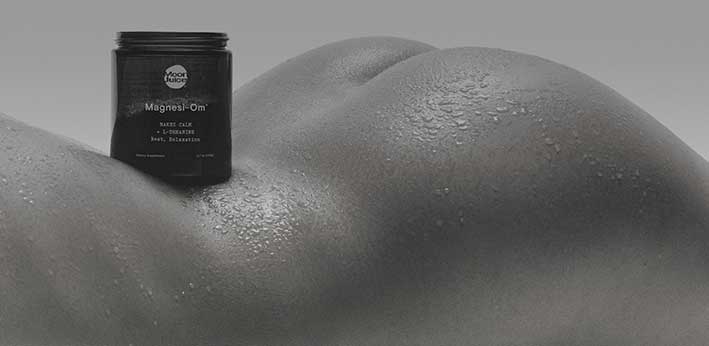
-(1).png?v=1680563507804)
.png?v=1680563520897)

